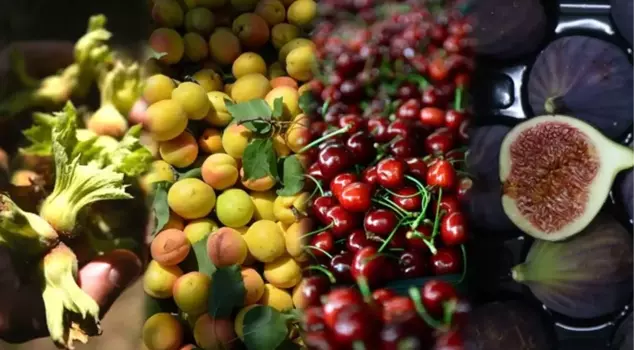
04.06.2024 11:33
Minister of Agriculture and Forestry, Ibrahim Yumaklı, announced that Turkey is the world leader in the agricultural sector. Turkey is the world leader in the production of hazelnuts, cherries, figs, apricots, quinces, and carob, while also holding a leading position in the world export of hazelnuts, dried apricots, dried figs, raisins, and quinces. The export of agricultural and food products has also increased to 31 billion dollars in 2023, with a trade surplus of 6.9 billion dollars.
The Minister of Agriculture and Forestry, Ibrahim Yumakli, announced that Turkey is the world leader in hazelnut, cherry, fig, apricot, quince, and carob production, and ranks first in the world in exports of hazelnuts, dried apricots, dried figs, raisins, and quinces. Minister Yumakli stated that Turkey, with its 23.9 million hectares of cultivated agricultural land, continues to be the leading agricultural country in Europe, meeting the food needs of its population of over 85 million and nearly 50 million tourists, as well as exporting agricultural products.
Minister Yumakli responded to a written question from Independent Antalya Deputy Aykut Kaya regarding the claim that the production of basic agricultural products is insufficient.
Yumakli stated that in the past 3 years, record-breaking production has been achieved in sugar beet, corn, sunflower, soybean, cotton, onion, kidney bean, oats, olives, apples, cherries, pears, figs, pistachios, mandarins, lemons, peaches, bananas, strawberries, pomegranates, plums, walnuts, quinces, almonds, kiwis, Trabzon persimmons, tomatoes, peppers, and cabbages. He used the following words: "As a result of the policies implemented in our country, significant increases in productivity per unit area have been achieved, and the total amount of plant production has increased. The plant production quantity, which was 98 million tons in 2002, increased by 39.5% to 136.9 million tons in 2023."
"WORLD LEADER IN WHEAT FLOUR EXPORTS"
Yumakli stated that according to the data of the Food and Agriculture Organization of the United Nations (FAO), Turkey ranks 12th in the world in the production of plant products, 4th in vegetable production, and 6th in fruit production. He provided the following information:
"Turkey is the world leader in hazelnut, cherry, fig, apricot, quince, and carob production. It ranks second in the world in the production of melons, watermelons, cucumbers, leeks, olives, mandarins, and apples. It ranks third in the world in the production of strawberries, chickpeas, and tomatoes. It ranks fourth in the world in the production of chestnuts, walnuts, pears, and lentils. It ranks fifth in sugar beet production. It ranks sixth in grape production and seventh in bulk cotton production. It is the leader in the world in the export of hazelnuts, dried apricots, dried figs, raisins, and quinces. It ranks first in wheat flour exports and second in maize exports."
PLANT PRODUCTION SUPPORT FOR FARMERS
Yumakli pointed out that Turkey meets its domestic needs in the agricultural sector and is a net exporter of agricultural and food products. He shared the information that "Our agricultural and food product exports, which were 3.8 billion dollars in 2002, reached 31 billion dollars in 2023, and a foreign trade surplus of 6.9 billion dollars was achieved in 2023."
Yumakli stated that support is provided to farmers for plant production and said, "As a result of the activities carried out by our Ministry to bring idle and vacant areas and fallow lands into agricultural production, 4.7 million hectares of land have been brought into agricultural production in the last two years, fallow lands have been reduced by 2.45 million hectares, and the cultivated area of field crops has increased by 6.49 million hectares."
AGRICULTURAL SUPPORT WILL BE 91.55 BILLION LIRA IN 2024
Yumakli emphasized that 12 separate projects are being carried out to improve plant production and rehabilitate pasture areas, and stated the following:
"Projects are being implemented nationwide to increase plant production by using appropriate production techniques in areas that are not included in the planting program and are allocated for fallow, as well as in areas unsuitable for arable farming, with a maximum of 75% in-kind support."
Yumakli stated that support payments are made to farmers in order to increase plant production, improve yield and quality, ensure sustainability, increase registration, and develop environmentally friendly alternative farming techniques. He stated that agricultural support will amount to 91.55 billion lira in 2024.